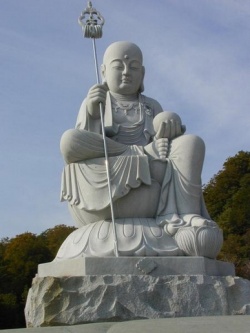Difference between revisions of "Why is Tibetan Buddhism more popular?"
m (Text replacement - "fruitful" to "fruitful") |
|||
| Line 20: | Line 20: | ||
* TB is not heavily tied to an immigrant ethnicity unlike, say, [[Chinese Buddhism]] which is very closely tied to a specific {{Wiki|ethnic}} group. {{Wiki|Chinese}} [[Buddhist traditions]] might even specifically promote themselves as exclusively "{{Wiki|Chinese}} [[Buddhist]]" and in the process exclude members of the host {{Wiki|culture}}. | * TB is not heavily tied to an immigrant ethnicity unlike, say, [[Chinese Buddhism]] which is very closely tied to a specific {{Wiki|ethnic}} group. {{Wiki|Chinese}} [[Buddhist traditions]] might even specifically promote themselves as exclusively "{{Wiki|Chinese}} [[Buddhist]]" and in the process exclude members of the host {{Wiki|culture}}. | ||
* The [[intellectual]] and [[scholarly]] [[traditions]] within TB are more readily accessible and understood by [[Tibetan]] [[monastics]] and [[teachers]], while this may not be the case with {{Wiki|East Asian}} [[teachers]] where it is largely just {{Wiki|academics}} who understand the classical {{Wiki|scholarship}} and can thoroughly discuss such [[subjects]]. In contrast TB [[traditions]] tend to promote such [[activities]] more readily than most {{Wiki|East Asian}} [[traditions]]. TB places more {{Wiki|emphasis}} on critical [[thinking]] and [[debate]], at least formally, than contemporary {{Wiki|East Asian}} [[traditions]] which are more devotional and deferential in their orientation. | * The [[intellectual]] and [[scholarly]] [[traditions]] within TB are more readily accessible and understood by [[Tibetan]] [[monastics]] and [[teachers]], while this may not be the case with {{Wiki|East Asian}} [[teachers]] where it is largely just {{Wiki|academics}} who understand the classical {{Wiki|scholarship}} and can thoroughly discuss such [[subjects]]. In contrast TB [[traditions]] tend to promote such [[activities]] more readily than most {{Wiki|East Asian}} [[traditions]]. TB places more {{Wiki|emphasis}} on critical [[thinking]] and [[debate]], at least formally, than contemporary {{Wiki|East Asian}} [[traditions]] which are more devotional and deferential in their orientation. | ||
| − | * TB figures have been engaging [[scientists]] in | + | * TB figures have been engaging [[scientists]] in fruitful [[discussion]] in the last number of years. In a {{Wiki|society}} which highly esteems [[science]] it gives a [[religious]] [[tradition]] a positive image to have open {{Wiki|dialogue}} with [[scientists]]. |
* [[Japanese]] [[monasticism]] is so limited as to be unavailable to most foreigners. {{Wiki|Chinese}} [[monasticism]] on the other hand is possible, though the {{Wiki|culture}} is extremely demanding in terms of the {{Wiki|hierarchy}}. There might also be a lack of autonomy. Moreover, the strict expectation that one will conform to {{Wiki|Chinese culture}} and behave as is expected of a {{Wiki|Chinese}} [[bhikṣu]] is something many westerners I think simply could not tolerate over the long-term. [[Wikipedia:Taiwanese people|Taiwanese]] [[Buddhist]] organizations have vast sums of [[wealth]] and would happily take {{Wiki|western}} applicants, but between the big four there are probably less than two dozen {{Wiki|western}} [[monastics]]. | * [[Japanese]] [[monasticism]] is so limited as to be unavailable to most foreigners. {{Wiki|Chinese}} [[monasticism]] on the other hand is possible, though the {{Wiki|culture}} is extremely demanding in terms of the {{Wiki|hierarchy}}. There might also be a lack of autonomy. Moreover, the strict expectation that one will conform to {{Wiki|Chinese culture}} and behave as is expected of a {{Wiki|Chinese}} [[bhikṣu]] is something many westerners I think simply could not tolerate over the long-term. [[Wikipedia:Taiwanese people|Taiwanese]] [[Buddhist]] organizations have vast sums of [[wealth]] and would happily take {{Wiki|western}} applicants, but between the big four there are probably less than two dozen {{Wiki|western}} [[monastics]]. | ||
* TB {{Wiki|culture}} is generally more [[relaxed]] and free than [[Chinese Buddhism]]. For example, in a {{Wiki|Chinese}} [[temple]] there will be choreographed group [[prostrations]] done in [[traditional]] long flowing [[robes]] (laity included). There are prescribed [[forms]] for how to properly [[bow]], [[prostrate]], salute, eat and walk. In a TB [[gonpa]], on the other hand, you can generally do things in whichever way you please. Seating is usually first come first serve without the [[gender]] segregation you see in {{Wiki|Chinese}} [[temples]]. | * TB {{Wiki|culture}} is generally more [[relaxed]] and free than [[Chinese Buddhism]]. For example, in a {{Wiki|Chinese}} [[temple]] there will be choreographed group [[prostrations]] done in [[traditional]] long flowing [[robes]] (laity included). There are prescribed [[forms]] for how to properly [[bow]], [[prostrate]], salute, eat and walk. In a TB [[gonpa]], on the other hand, you can generally do things in whichever way you please. Seating is usually first come first serve without the [[gender]] segregation you see in {{Wiki|Chinese}} [[temples]]. | ||
Latest revision as of 14:19, 30 December 2014
Why is Tibetan Buddhism more popular?
By Indrajala (Jeffrey Kotyk)
I have come to think that in the English speaking world Tibetan Buddhism (hereafter TB) is somewhat more popular than other types of Mahāyāna Buddhism. While I do not have statistics available and none are probably available at the moment, I believe the following points demonstrate a greater widespread interest in TB:
- Volume of printed materials on Tibetan Buddhism compared to works on East Asian traditions is comparatively greater. The latter often seem to be more academic and inaccessible to ordinary readers.
- The number of students in East Asia from the west studying Buddhism seems much smaller than those going to India and elsewhere to specifically study and practice TB. If you wanted to study Buddhism in Taiwan, they would basically pay you to do so, but not so many students have an interest. On the other hand, International Buddhist Academy and Rangjung Yeshe Institute in Kathmandu attract dozens of new students every year who pay US$6000 or more in tuition, room and board out of their own pockets. There are a lot of fresh students every year who travel to Dharamsala specifically to study Tibetan at their own expense. Japanese Buddhist Universities have a few western students, but they're usually on scholarship (or at least in my own observations), and probably half or more are scholars and not practitioners.
- Taiwanese Buddhist organizations like Foguang Shan and Dharma Drum Mountain have vast sums of wealth and resources, yet between them there are less than two dozen western monastics. Meanwhile I hear about many western Tibetan Buddhists very much wanting to ordain, but not having any economic means to support themselves.
- Tibetan teachers draw larger crowds of long-term committed students and disciples. HH the Dalai Lama easily fills stadiums of not just Buddhists, but also people with a general interest in what he has to say.
- TB groups are working on the 84,000 Project, an ambitious plan to translate the Tibetan canon, whereas no such comparable project is in the works with the East Asian Chinese canon. Plenty of it is being translated, but nothing coordinated on the same scale of 84,000.
- TB groups are rapidly producing translators. Many colleges and programs now exist for that express purpose, yet nothing comparable is seen within Japanese or Chinese traditions. This is clearly not a priority for East Asian traditions.
Now it begs the question why would this be?
- TB traditions have linear and progressive curricula. For instance, Lama Tsongkhapa's Lam Rim Chen Mo is an exhaustive and complete manual read by all Gelug-pa students. Similar works exist in Chinese and Japanese, such as the work of Tiantai Zhiyi, though contemporary traditions, with perhaps the exception of Soto Zen, do not necessarily use such manuals in the same manner as Tibetan traditions do.
- A lot of the eminent TB teachers speak English. Some East Asian teachers speak English, but many don't. The household names in Japanese and Taiwanese-Chinese Buddhism that are well known in their respective countries are largely unknown in the western Buddhist world.
- The Dalai Lama is a recognizable and attractive figurehead who speaks English. Other eminent figures like HH Sakya Trizin speaks English as well.
- TB is not heavily tied to an immigrant ethnicity unlike, say, Chinese Buddhism which is very closely tied to a specific ethnic group. Chinese Buddhist traditions might even specifically promote themselves as exclusively "Chinese Buddhist" and in the process exclude members of the host culture.
- The intellectual and scholarly traditions within TB are more readily accessible and understood by Tibetan monastics and teachers, while this may not be the case with East Asian teachers where it is largely just academics who understand the classical scholarship and can thoroughly discuss such subjects. In contrast TB traditions tend to promote such activities more readily than most East Asian traditions. TB places more emphasis on critical thinking and debate, at least formally, than contemporary East Asian traditions which are more devotional and deferential in their orientation.
- TB figures have been engaging scientists in fruitful discussion in the last number of years. In a society which highly esteems science it gives a religious tradition a positive image to have open dialogue with scientists.
- Japanese monasticism is so limited as to be unavailable to most foreigners. Chinese monasticism on the other hand is possible, though the culture is extremely demanding in terms of the hierarchy. There might also be a lack of autonomy. Moreover, the strict expectation that one will conform to Chinese culture and behave as is expected of a Chinese bhikṣu is something many westerners I think simply could not tolerate over the long-term. Taiwanese Buddhist organizations have vast sums of wealth and would happily take western applicants, but between the big four there are probably less than two dozen western monastics.
- TB culture is generally more relaxed and free than Chinese Buddhism. For example, in a Chinese temple there will be choreographed group prostrations done in traditional long flowing robes (laity included). There are prescribed forms for how to properly bow, prostrate, salute, eat and walk. In a TB gonpa, on the other hand, you can generally do things in whichever way you please. Seating is usually first come first serve without the gender segregation you see in Chinese temples.
- TB has a tradition of debate and it is not considered impolite to engage in it with your superiors.
I think these points generally explain why TB is more popular than any other type of Mahāyāna Buddhism in the west. After having some experience with Tibetan, Japanese and Chinese traditions of Buddhism I have come to honestly think TB is far more approachable and accommodating than Chinese Buddhism, at least as I have seen it in Taiwan.
I imagine unless there are large changes to Chinese traditions they'll never really make in-roads into the western world. Some people might take an interest in Chan practice, but forming living stable traditions in new lands means having strong communities and a culture everyone can relate to. For various reasons it seems many westerners can invest themselves emotionally, materially and spiritually into Tibetan traditions, but that is not at all the case with Chinese traditions. I think my points above start to explain perhaps why.
In passing I should note that some years ago Chan Master Sheng Yen and His Holiness the Dalai Lama did have a dialogue. I wrote about this before here.


